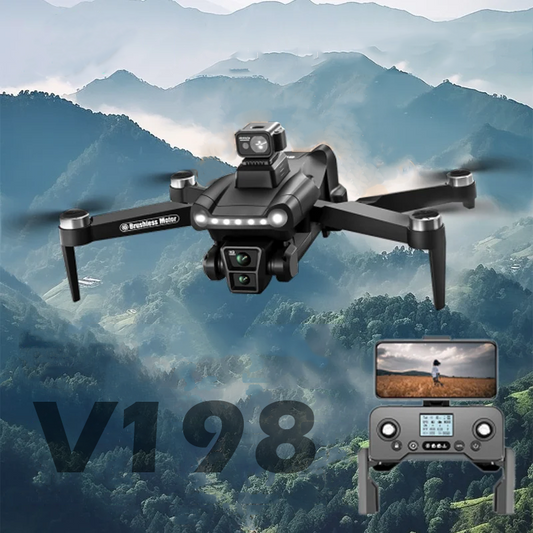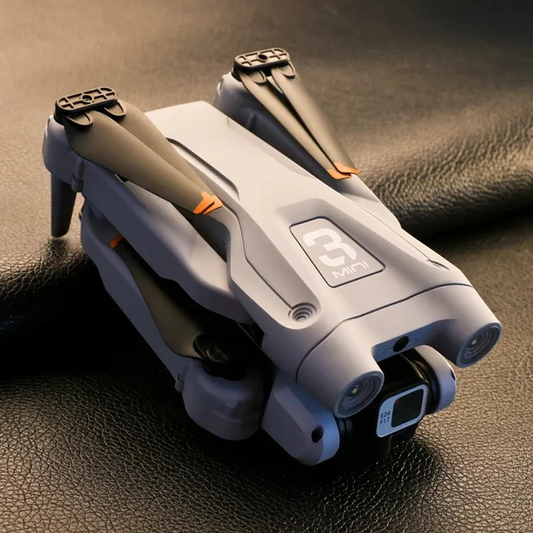High-Altitude Drones: Exploring the Stratosphere

In the ever-evolving landscape of technology, high-altitude drones have emerged as trailblazers, pushing the boundaries of what was once deemed impossible. These cutting-edge unmanned aerial vehicles (UAVs) are taking exploration to new heights, quite literally, as they venture into the stratosphere, unlocking a realm of possibilities that were once confined to our wildest imaginations.
1.The Rise of High-Altitude Drones

High-altitude drones, also known as high-altitude pseudo-satellites (HAPS) or stratospheric drones, have soared into prominence for their ability to operate at altitudes well above the capabilities of traditional drones. These unmanned marvels can reach altitudes ranging from 60,000 to 100,000 feet, cruising through the stratosphere with ease.
One of the key advantages of deploying high-altitude drones is their prolonged flight endurance. Unlike conventional drones limited by battery life, these high-fliers can stay airborne for weeks or even months, offering an unprecedented advantage for various applications, from scientific research to communication infrastructure.
2.Exploring the Stratosphere

The stratosphere, a layer of Earth's atmosphere extending from about 10 to 50 kilometers above the surface, has long fascinated scientists and explorers. High-altitude drones are now enabling us to delve into this mysterious realm, opening up opportunities for research and advancements in multiple domains.
3.Scientific Research and Environmental Monitoring

One of the primary applications of high-altitude drones is in scientific research. Equipped with state-of-the-art sensors and instruments, these drones are instrumental in collecting valuable data about the Earth's atmosphere, climate, and environment.
From monitoring greenhouse gas emissions to studying atmospheric phenomena, high-altitude drones offer a cost-effective and efficient means of gathering data that was once challenging to obtain. Researchers can deploy these drones to track changes in the ozone layer, study weather patterns, and even monitor wildlife populations in remote areas.
4.Communication Infrastructure and Connectivity

As our dependence on high-speed internet continues to grow, the need for robust communication infrastructure becomes paramount. High-altitude drones are playing a pivotal role in expanding connectivity, particularly in remote or underserved areas.
These stratospheric drones can serve as airborne cell towers, relaying signals across vast expanses. By hovering at high altitudes, they can cover larger areas than traditional ground-based infrastructure. This makes them an ideal solution for bridging the digital divide and bringing connectivity to regions with challenging terrain or limited resources.
5.Surveillance and Security

The capabilities of high-altitude drones are not limited to peaceful applications. Governments and security agencies are leveraging these advanced UAVs for surveillance and security purposes. Equipped with high resolution cameras and other surveillance technologies, these drones can monitor large areas for potential threats and provide real-time data to decision-makers.
Border patrol, disaster response, and critical infrastructure protection are just a few examples of how high-altitude drones are enhancing security efforts. Their ability to stay aloft for extended periods allows for continuous monitoring, making them valuable assets in maintaining public safety.
6.Advancements in Solar-Powered Drones

The power source is a critical factor in the endurance of high-altitude drones. Many of these innovative UAVs are powered by solar energy, harnessing the sun's rays to sustain prolonged flight. Solar-powered high-altitude drones have photovoltaic panels covering their wings or body, converting sunlight into electricity to power their systems and propel them through the skies.
This sustainable approach not only extends their flight endurance but also aligns with the growing emphasis on eco-friendly technologies. By relying on renewable energy, these drones reduce their environmental impact and contribute to a more sustainable future.
7.Challenges and Future Prospects

While high-altitude drones hold immense potential, they are not without challenges. Regulatory frameworks, safety concerns, and airspace management are some of the hurdles that need to be addressed as these advanced UAVs become more prevalent. Striking a balance between innovation and responsible deployment is crucial to harness the benefits of high-altitude drones while ensuring safety and compliance.
Looking ahead, the future of high-altitude drones appears promising. Continued advancements in technology, coupled with ongoing research, are likely to overcome current challenges. As these drones become more accessible and widespread, their applications will undoubtedly expand, opening up new frontiers for exploration, research, and connectivity.
High-altitude drones are ushering in a new era of exploration, pushing the boundaries of what is achievable in the stratosphere. From scientific research and environmental monitoring to communication infrastructure and security applications, these advanced UAVs are revolutionizing the way we interact with the world above.
As we navigate the challenges and embrace the opportunities presented by high-altitude drones, it is clear that their impact will extend far beyond the confines of the stratosphere. These airborne marvels are not just tools for exploration; they are catalysts for innovation, connectivity, and a sustainable future. So, as high-altitude drones continue to soar to new heights, we find ourselves on the brink of a technological revolution that promises to reshape our world in ways we are only beginning to comprehend.
Explore a variety of drones at our online drone store.
Happy Flying!









